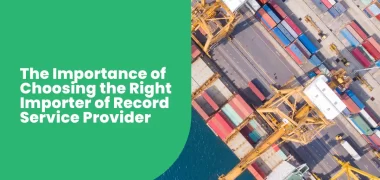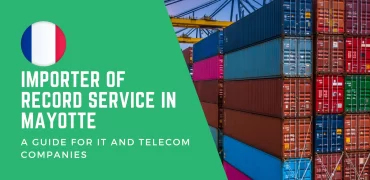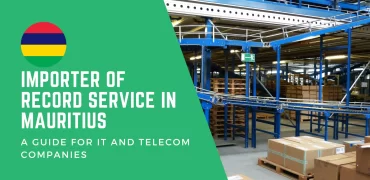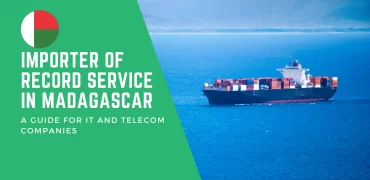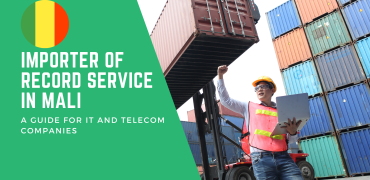International trade is fraught with regulatory complexities, and any misstep can lead to severe consequences, including fines, shipment delays, and even legal repercussions. An effective Importer of Record (IOR) service provider can mitigate these risks by ensuring compliance with all relevant laws and regulations. Additionally, a competent IOR provider can streamline your supply chain, enhance operational efficiency, and provide peace of mind, allowing you to focus on growing your business. Here’s a deeper dive into the key aspects to consider when selecting an IOR service provider.
Detailed Analysis of Key Aspects
1. Experience and Expertise
Experience and expertise in the specific industry and regions of operation are paramount. An experienced provider will have:
In-depth Regulatory Knowledge: They should understand the intricacies of customs regulations, import duties, and compliance requirements specific to your industry. For example, the importation of electronics, pharmaceuticals, and food products each has unique regulatory hurdles.
Established Relationships: Providers with long-standing relationships with local customs authorities can facilitate smoother and faster customs clearance processes.
Case Studies and Success Stories: A seasoned provider will have documented case studies showcasing their ability to handle complex import scenarios successfully.
2. Compliance and Certifications
In the world of international trade, compliance is non-negotiable. Ensure that your chosen IOR provider is:
AEO Certified: The Authorized Economic Operator (AEO) certification is a globally recognized quality mark indicating that a company’s role in the international supply chain is secure and that its customs controls and procedures are efficient and compliant.
ISO Certifications: ISO 9001 (Quality Management) and ISO 28000 (Security Management for the Supply Chain) certifications are indicators of a provider’s commitment to maintaining high standards.
Regular Audits: Providers that undergo regular audits demonstrate a commitment to compliance and continuous improvement.
3. Range of Services
A comprehensive service offering is critical to ensure all your needs are met. Key services should include:
Customs Brokerage: Expertise in customs documentation, tariff classification, and duty management.
Freight Forwarding: Coordination of shipping logistics, whether by air, sea, or land.
Trade Consulting: Guidance on trade agreements, tariff codes, and regulatory changes that could impact your business.
Post-Importation Services: Support with duties recovery, compliance audits, and record-keeping.
Technology Integration: Utilization of systems that integrate with your own supply chain management software for seamless data exchange and tracking.
4. Reputation and References
A provider’s reputation can provide significant insights into their reliability and quality of service. Consider:
Industry Recognition: Awards, recognitions, and memberships in trade organizations can be indicators of a provider’s credibility and industry standing.
Client Portfolio: A diverse and satisfied client base, especially those in your industry, can be a strong indicator of the provider’s capability.
References and Testimonials: Don’t hesitate to ask for references and speak directly with current or past clients about their experiences.
5. Cost-Effectiveness
While cost should not be the sole determining factor, it is essential to:
Evaluate All Costs: Ensure all fees, including hidden charges, are disclosed upfront. Compare costs relative to the value provided.
Analyze Cost vs. Benefit: Consider the potential cost savings from avoiding regulatory fines, reduced shipping delays, and enhanced efficiency against the service fees charged by the provider.
6. Customer Support
Effective customer support can significantly impact your experience. Look for:
24/7 Support: Availability of round-the-clock support to handle any emergencies or urgent queries.
Dedicated Account Managers: Having a single point of contact who understands your business needs can enhance service delivery.
Proactive Updates: Regular updates on shipment status, regulatory changes, and any potential issues.
7. Flexibility and Scalability
Your business needs may evolve, requiring a provider who can:
Adapt to Changes: Whether it’s scaling operations, adapting to new regulatory requirements, or handling new types of products, flexibility is key.
Offer Custom Solutions: The ability to tailor services to meet specific requirements, such as handling sensitive goods or providing specialized logistics solutions.
8. Risk Management
A robust risk management strategy is essential. Ensure the provider offers:
Contingency Planning: Plans to manage and mitigate risks such as customs delays, strikes, and other unforeseen events.
Insurance Coverage: Adequate insurance coverage for goods in transit to protect against loss or damage.
Proactive Risk Assessment: Regular risk assessments to identify and mitigate potential threats to the supply chain.
Conclusion
Selecting the right Importer of Record service provider is a strategic decision that requires careful consideration of multiple factors. By focusing on experience, compliance, comprehensive services, reputation, cost-effectiveness, customer support, flexibility, and risk management, you can ensure that your international trade operations are efficient, compliant, and resilient. A reliable IOR service provider not only helps you navigate the complexities of international trade but also acts as a valuable partner in achieving your business goals.
Choosing wisely can lead to significant benefits, including reduced risk of compliance issues, streamlined operations, and enhanced focus on your core business activities. Make an informed decision to secure your place in the global marketplace with the right Importer of Record service provider by your side.
